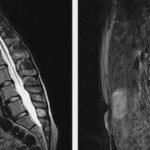Fill out form to enquire now
MRI LS Spine Flexion
Medintu has collaborated with the best pathology laboratories that are NABL and NABH certified and follow ISO safety guidelines to provide the best MRI LS Spine Flexion at an affordable price for needy individuals. In general, an MRI LS Flexion refers to Imaging of the lumbar spine in the forward-bent or flexed position though the abbreviation MRI LS stands for magnetic resonance imaging lumbar spine. In contrast to conventional spine MRI, which is generally performed in the unweighted or extended position, the flexion MRI reveals the spine in weight-bearing, dynamic states of stress or motion. This makes it an essential examination aid when diagnosing situations that are worsened or more easily diagnoses when the spine is flexed forward.
Lumbar spine is located in the lower back region of the body and is significant in the process of weight bearing and weight sharing for movement. That said, the spine is not immune to a host of ailments like slipped disc, nerve compression and changes in the orthopedic structure. Using MRI in comparison with the flexed position the healthcare providers will get a better and more detailed view at these conditions and identification of problems that can be masked while traditional MRI. To schedule an appointment for MRI LS Spine Flexion, simply contact Medintu or call our customer care at +919100907036 or +919100907622 for more details and queries.
What is the LS Spine Flexion in MRI?
The LS Spine Flexion in MRI is the term used to describe the fact that a certain imaging technique captures images of the lumbar section of the spine (the lower back) when the spine is flexed. In this case, flexion of the spine is more interpreted as bending the spine forward, often in the manner that one extends a hand towards the toes or feet. This position is important for understanding its response when under stress or during movement, something that in normal position or flexion the researcher may not get as much data regarding the same.
MRI at the lumbar spine is normally done in stance or in extension meaning the spine and therefore bones are not curved. Yet, there are some conditions like disc herniation, spinal stenosis or nerve compression, which may become more expressive or the structures affect each other differently depending on the spine flexion. As doctors make the lumbar spine flexion during an MRI, you get dynamic images that make it easy to diagnose several cases that might not be diagnosed when conducting a normal MRI scan. This makes the MRI LS Spine Flexion particularly useful in cases where conditions affecting the mobility of the lower back are of essence.
Why is an MRI LS Spine Flexion Performed?
An MRI LS Spine Flexion is done to produce detailed, dynamic images of the lumbar spine when it is flexed or bent forward. This is a specialized imaging technique that is particularly useful in the diagnosis of conditions that cannot be easily detected in neutral or extended positions. Following are some of the reasons why one needs to have an MRI LS Spine Flexion done:
- Better Visualization of Spinal Conditions Aggravated by Flexion
It follows that many lumbar conditions related to the spine- particularly intervertebral disc herniates as well as spinal stenosis-poorly tolerate when they are bent forward or put into a flexion-based type posture. The pressure along nerves will more easily cause disc herniation when one is in their posture or bent forward, which contributes for better diagnosis of lumbar spine conditions when using bends or forward movements during walking.
- Detect Nerve Compression or Radiculopathy
The compression of the nerves is one of the most common conditions of the spine. With flexion, the lumbar structures like the discs or the facet joints can compress the spinal nerves more than with a neutral or extended position. This can provide a better view of the effects of flexion on the pathways of the nerves. MRI LS Spine Flexion can assist in the diagnosis of radiculopathy, pain, numbness, or weakness in the legs, caused by the compression of nerves.
- Assessment of Spinal Instability
Spinal instability like spondylolisthesis, where one vertebra slips out of position over another, can be difficult to be visualized in neutral. Flexion may reveal abnormal movement or slippage of the vertebral bodies, thereby providing a better assessment of the severity of the disease, which is important in planning the appropriate treatment- surgical or non-surgical.
- Detection of Disc Protrusion or Bulging
Disc prolapse (a slipped disc) or herniation can sometimes not be seen in a neutral MRI, especially when the prolapsed disc does not protrude much. However, in the flexed position, the increased pressure on the discs may make them bulge or herniated more, and thus it will be easier to diagnose.
- Diagnosis of Spinal Stenosis
Spinal stenosis is that process by which the spinal canal diminishes with subsequent compression to the spinal cord or its nerves. MRI LS spine with flexion aims at visualizing how it worsens with a position such as this to assess more on how the degree of narrowing would impair the spinal cord and nerve function.
Benefits of MRI LS Spine Flexion
It is with several significant benefits, thus crucial to the diagnosis and evaluation of conditions that concern the lumbar spine, in order to capture clear images of the spine on flexion, thereby capturing a picture that can, for doctors to explain spinal health, provide treatment accordingly. Following are some of the benefits of MRI LS Spine Flexion.
- Diagnostic tool non-invasive in nature
MRI is a non-invasive procedure. This means that no surgery or injections are required. It uses magnets and radio waves to create highly detailed images of the spine. It is therefore safer than most diagnostic procedures, such as CT scans or X-rays, which involve radiation.
- Improved Visualization of Flexion Aggravated Conditions
For instance, bending forward is the inflexed position in which one can see conditions of a herniated disc, spinal stenosis, or even nerve compression, wherein sometimes, these can be seen a little on bending forward. It’s going to give a clear view of any problem that might not have shown itself in the neutral position for which the patient has an MRI of LS Spine Flexion.
- Diagnosis of Nerve Compression and Radiculopathy
This refers to the compression of structures within the lumbar spine on the spinal nerves that cause pain, numbness, or weakness, normally in the legs. There are other conditions such as radiculopathy- pain connected to the nerve roots that even diagnose a patient’s condition if they are under flexed position; thereby, physicians may identify the underlying cause and select the best treatment option.
- Assess Spinal Instability
In conditions of spinal instability like spondylolisthesis, MRI LS Spine Flexion is helpful in determining abnormal movement of the vertebrae, which cannot be imaged in neutral or in an extended position. It is of great clinical relevance when there is alteration of vertebral position, carrying discomfort and disability into the spinal canal.
- Detailed Disc Protrusion or Hesitation
This is because herniation or prolapse of the disc may not show on a neutral MRI scan. The pressure will have increased on the discs on flexion and can sometimes bulge or even herniate, making it very easy for the doctor to make the right diagnosis.
- Test Type: MRI LS Spine Flexion
- Preparation:
- Wear a loose-fitting cloth
- Fasting not required
- Carry Your ID Proof
- Prescription is mandatory for patients with a doctor’s sign, stamp, with DMC/HMC number; as per PC-PNDT Act
- Reports Time: With in 24 hours
- Test Price: Starts from Rs.4000 to Rs.8000
How to book an appointment for a MRI LS Spine Flexion?
To schedule an appointment for MRI LS Spine Flexion, simply contact Medintu or call our customer care at +919100907036 or +919100907622 for more details and queries.
What is an MRI LS Spine Flexion?
MRI LS Spine Flexion is a form of advanced imaging that captures highly detailed pictures of the lumbar spine, the lower part of the back, which is taken when your spine is in a bent or flexed position, which can show some problems that would otherwise not be visible, like bulging discs, nerve compression, and spinal instability.
How is MRI LS Spine Flexion different from an ordinary MRI?
A typical MRI is taken when the spine is either in neutral posture or fully extended. In MRI LS Spine Flexion, however, the picture of the lumbar spine is taken when it is bent forward, which gives the patient a dynamic view and conditions that are often exacerbated or may only appear under flexion.
Is MRI LS Spine Flexion Painful?
No, the actual MRI procedure is not painful. Nevertheless, depending on how tight your spine is you can experience some discomfort at a position where you are put when performing the scan. When feeling unbearable discomfort, notify the technician to adjust the position and add support for making it comfortable.
What Can MRI LS Spine Flexion Diagnose?
MRI LS Spine Flexion is commonly prescribed in the diagnosis of conditions, which include:
- Herniated or bulging discs
- Spinal stenosis
- Facet joint arthritis
- Disc degeneration
- Spinal instability, for example, spondylolisthesis
- Compression of nerves or radiculopathy
How long does the procedure for MRI LS Spine Flexion take?
The procedure usually takes 20 to 40 minutes, depending on the complexity of the case and the number of images required. The MRI technician will position you correctly and guide you through the procedure.
Do I need to prepare for the MRI LS Spine Flexion?
In most cases, you don’t need to prepare. You will be asked to remove any metal objects, such as jewelry or watches, before the scan. It is advisable to wear loose, comfortable clothing to avoid discomfort during the procedure. If you have any concerns or specific instructions, your healthcare provider or the MRI facility will give you detailed guidelines.
Is MRI LS Spine Flexion safe?
Yes, MRI LS Spine Flexion is a non-radiation procedure. X-rays or CT scans expose you to radiation, but MRI does not because it uses magnets and radio waves. Nonetheless, if you have some implants or devices in your body (like a pacemaker or metal implants), let your doctor know; they might interfere with the MRI.
Can I have an MRI LS Spine Flexion if I am pregnant?
Generally, MRI scans are quite safe during pregnancy, more so after the first trimester. However, you should discuss this with your doctor before starting any procedure during pregnancy, for them to decide whether it’s necessary and safe for you.
Why Choose Medintu for an MRI LS Spine Flexion?
Medintu is an online medical consultant, which offers home services not only in your city but also in all major cities of India, such as Hyderabad, Chennai, Mumbai, Kolkata and others. This makes it easy for us to work with diagnostic centers that boast of having the most accurate equipment. The customer service for booking the appointment of the services is available 24/7 and Medintu also comes with instructions. Medintu has not only the best diagnostic centres, but it offers them at very cheaper prices. If you have been tested, you can promptly schedule an appointment with a health care service through our list of skilled physicians. For appointments for MRI LS Spine Flexion, you can chat with us through Medintu or call our customer care at 919100907036 or 919100907622 for more information or inquiries.





